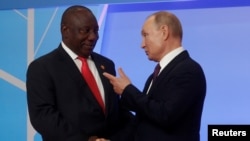Joseph Siegle, at the Africa Center for Strategic Studies, describes the continent as a “theatre” for Russia’s geostrategic interests.
Siegle believes that Africa is not a destination in itself for Russia, but rather a place in which Moscow can exert its presence and prowess in the face of the United States and other major powers. He explains that Russia is not investing significantly in conventional statecraft in Africa—e.g., economic investment, trade, and security assistance.
Instead, he says, Russia relies on a series of asymmetric measures for influence such as mercenaries, arms, opaque contracts, and using disinformation to sway both people and politicians.
Siegle stresses that while uninviting for African citizens, the Russian model is attractive to certain African leaders who benefit politically and financially from Russia’s backing.
“In Russia, opposition voices are intimidated and imprisoned. Protesters aren't allowed. The economy is heavily controlled by an oligarchic network. And so, it's a very transactional model where the laws are arbitrary.” Siegle observed.
According to the Washington -based research organization The Brookings Institution, Russia has signed 19 military collaboration agreements with African governments. Militarily, Russia is an important defense partner for Africa and the major supplier of arms to the region except for Egypt.
Russian mercenaries are training military forces in the Central African Republic which is raising concerns about human rights abuses. The presence of the Wagner Group, a private military company associated with Yevgeny Progozhin, a Russian oligarch with close ties to Vladimir Putin, raises concerns that Moscow is contributing to more destabilization especially in Libya and Central Africa.
But Cameron Hudson, at the Atlantic Council’s Africa Center, does not believe that Putin’s strategy is to destabilize Africa.
“I think that Putin's strategy is to try to gain influence in Africa, like in other parts of the world and the places where he has the most opportunity to gain influence are those places with weak institutions, with weak governance, and many of those places happen to be in Africa. I believe that is a strategy to present an alternative model of governance around the world.” Cameron said.
Analysts say the Russian attack on Ukraine provides leverage for Moscow with African states. The conflict has disrupted grain shipments from ports along the Black Sea, which NGO Human Rights Watch says has worsened the food security crisis in many African countries. And the Russia-Ukraine conflict has also hampered African exports to that region. These impacts on Africa have caused some of its leaders to call for the West to stop enabling Ukraine to continue fighting by supplying Kyiv with fresh arms and cash support.
Siegel argues that Russia’s invasion of and attempt to annex all or parts of Ukraine has always been more than just a bilateral dispute but an explicit effort to redefine international norms.
“At its core," he said, "Putin's view of international order is an imperialist model where larger stronger countries are justified in seizing territory from smaller neighbors regardless of international law regarding sovereignty and territorial integrity.”
